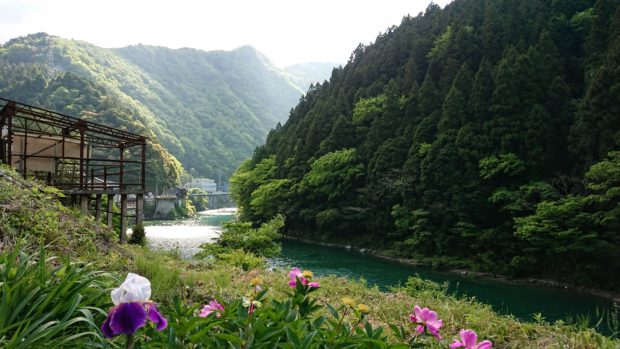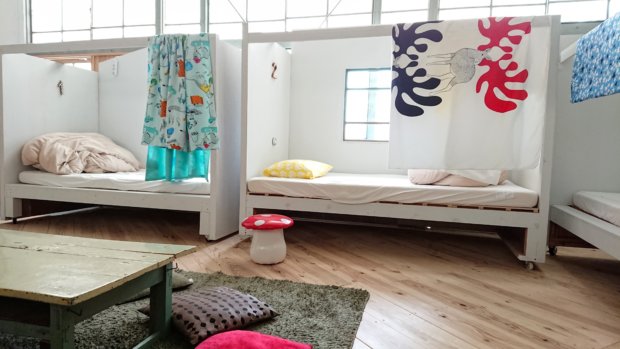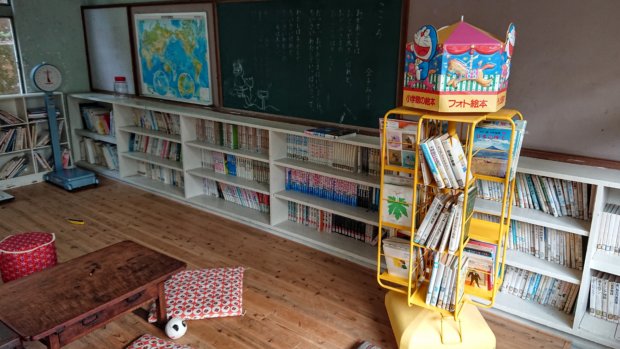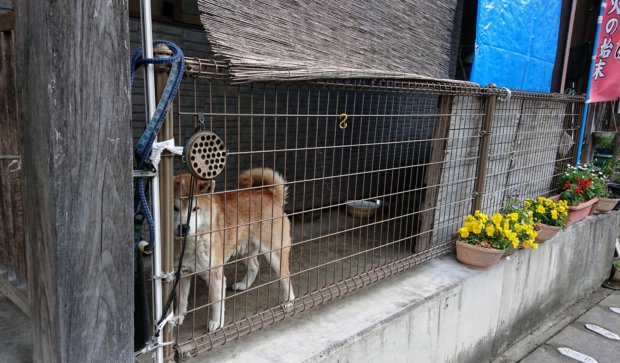You have no items in your cart. Want to get some nice things?
Go shopping
Start from part one of this series.
Up until our honeymoon, my husband and I had lived in London – a part of South London only served by Southern Rail. We were, therefore, practised in waiting for delayed or cancelled services for amounts of time so vast that even Oliver Sacks’ patients would struggle to process the figure. We had, however, not experienced a moment’s error in Japan’s transport schedules – so far.
Our abandonment of the Pissing Boy pilgrimage wasn’t only down to the fact that I’d been lagging roughly three hundred metres behind my husband throughout the trek; we also had to make the penultimate train from one village to the next. We arrived at Oboke station in time, and celebrated with the ice cream I was promised but not granted on the hike. But the minutes ticked by, and the Japanese tannoy sounded robotically apologetic in an all-too-familiar way. We needed this train to come. We needed to get to our next stop, because we needed to get a particular bus. There would be no other buses to take us to our next hostel, whose remoteness was now looking anything but charming. Everything rode on this one train. Nineteen minutes late, it swanned up to us as if greeting guests at a soirée. Feet tapping, time checked every five seconds on our phones, we all but jumped from the train when it finally pulled up at our destination: Iyaguchi. As I frantically enlarged and prodded and swiped at Google Maps, rucksack threatening to spill, we sprinted to the bus stop. We’d made it, with two whole minutes to spare.
Or had we?
Five minutes passed. Ten. Twelve. Twenty.
Uselessly, I paced the road.
“It might be late. Maybe they’re just really unpunctual in this part of Japan.”
“No way. It must have been early.”
“Maybe it’s our phones.”
“But the train was late.”
“And buses are always late.”
“In England. This is Japan.”
We didn’t want to call a cab. We couldn’t waste our money like that, not when we might not be able to withdraw any more ‘round these parts. Just as we prepared ourselves for another trek through the Shikoku countryside, a small blue Toyota pulled up. We ran to it.
“Yes, I know,” said the young female driver when we showed her a printout of our hostel.
“Could you take us there? Please?”
She smiled yes.
On the fifteen-minute ride, we learned that our saviour was a professional rower, training for the 2020 Olympics. We laughed at the sound of Little Mix on her radio. A nervous laugh; how far we were from home, how we wanted to cling to something familiar. The rower shrugged, smiling. She had no idea who Little Mix were. From the back seat, I watched the hills pass by. I stretched my eyes through the forests around.
“There are many snakes,” said the rower. She was thoroughly amused by our whitened faces.
*

The Haretoke Design Hostel sits on a hill, overlooking a small riverside village. From the large dirt car park where our saviour left us, we made our way to its entrance, the walls painted with rainbows, foxes, monkeys and birds. This used to be a school.
“Why did it close?” I had asked the rower in the car.
“Not enough children,” she’d said. She hadn’t stopped smiling.
I wondered if the murals were a remnant of the building’s past, or an affectionate tribute to it. We checked in, and dumped our rucksack in our dorm. Here, childhood called to us once more. A group of wooden cots gathered around a central rug, coffee-table, floor cushions and a stool in the shape of a toadstool. Plush animals lay on top of each other; I couldn’t decide if this was supposed to suggest an orgy. Behind these I caught glimpses of a green chalkboard. Privacy came courtesy of a different-patterned sheet draped over each cot. The hostel gave off all the warmth and comfort of schooldays nostalgia. But I couldn’t help a lump in my throat at seeing the emptied classrooms covered up by these adorable touches.
*
If you want to attack me, ask me to remove my shirt. Before I turned fifteen and discovered green tea, water and not eating sandwiches between meals, my body terrorised the bathroom scales. This didn’t go unnoticed by my compatriots (perfect strangers would tell me I was fat) or my classmates (one guy pointed at the rolls of flab at my waist, daily). My most dreaded lesson was PE, during which I held masterclasses in being picked last. It didn’t matter if I scored home runs in rounders or kicked a ball into the sun; PE was followed by those hideous minutes in the changing rooms, in which the sweaty thin boys talked dirty to the punctuation of Axe deodorant hiss, and made me feel as small as their impression on bathroom scales. I faced the wall throughout.
Though I’ve since lost the weight, my formative years have branded me. When I returned to Cyprus for the first time since I migrated to England, simply driving past my old school made me feel physically sick. Now I go to the gym but come home to change. While others run shirtless at the first drop of sun, I stay hidden in a baggy t-shirt like a ’90s rapper.
Our hosts at the school-cum-hostel informed us that they had not yet installed showers. “We’re still renovating,” said the young man at Reception. “But as guests, you have a discount at the onsen. It’s only half an hour away.”
Onsen? A steaming room of naked – as in, completely naked – men? Fine, I would stay dirty. We’d only walked up and down hills for one day, I’d simply have to wait another twenty-four hours until we were back in civilisation for a private, lonely shower. Until then I would be the smelly man on the bus.
“Let’s go,” said my husband.
Of course I went.
We followed the road down the hill, through the dusk-lit village and along the river, intermittently flattening ourselves against the landscape for a passing car. We were seasoned walkers – this was more than a half-hour walk.
At least the time allowed me to reflect on what was about to happen, and how I would get through it. Nude. In a room full of other people. I’d taken the step of wearing my glasses instead of my lenses, so at least I didn’t have to see the horror on their faces. I consoled myself by focusing on Japanese politeness. I told myself these were local men I’d never see again. They were probably all old. They didn’t care. I was fine. What did it matter? We’re all bodies that grow old and die.
When we finally reached the onsen, darkness had fallen. We held our breaths as we requested entry; my husband, arm tattoo, might not be allowed in. Having just walked even further than intended on this sweaty day, the last thing we wanted was to have to walk all the way back to the hostel without a wash. Thankfully, we were admitted. We hired a couple of towels and went into the changing room.
Once my glasses were off, the world and all judgment fell away. Naked, my husband and I walked into the onsen. I battled to keep my gorge down.
The space must’ve been about ten metres squared. Steam, coupled with my blurry vision, obscured the bodies sitting in the wooden tub of hot spring water. A man had gone into the room ahead of us, to our eternal gratitude. For he sat down at one of a dozen plastic stools in front of a mirror and a shower. With all the vigour of someone scrubbing a wedding ring fallen into a sewer, he cleansed his body with water and soap, before stepping into the tub. Myopic and clueless, I may have been watching this poor man far too intensely. I hope he didn’t mind. All he was doing was showering before going into a hot tub; what lesson was I seeking in that? I’d turned an everyday act into some sort of ritual I had to be cautious not to ruin.
When I finally sank my burning limbs into the water, I was overcome with relief. The feeling rose so strongly I thought I might pass out. So pleasing was the sensation that it had replaced all my paranoia and self-consciousness. Even when I noticed that the man three feet away from me was another Westerner, my first thought was: “It doesn’t matter. I’ll never see this stranger again.”
Except we did see him again, about half an hour later in the changing rooms. Then later still, reuniting with his female partner and wondering in French where they might find a place to eat. And later still, at the hostel. In our dorm. I tried not to look down, or in his eyes, and pulled my flimsy sheet curtain over the cot to hide me from life.
*

While we waited for the hostel’s café to open for breakfast, my husband and I sat in the room that had most retained a classroom aesthetic. Chalkboards and maps adorned the walls. Waist-height bookcases held picture-books whose words we tried to decipher. And the rug on which we were sitting was littered with wooden toys; shapes to fit inside other shapes, cars, trains. These were what the little boy kept offering to us.
Tiny, nappied, he’d opened the slide door with a big grin on his face and staggered over to us in that excited-drunk manner of toddlers. Here we were, trying not to think about the purchase of our house and an impending mortgage, all going well, and now we’d become impromptu guardians of a mysterious child. Only the night before, we’d hooked onto a Wi-Fi connection to stream Christina Aguilera’s Accelerate. In this very wholesome room, we had watched a video in which liquids poured suggestively over a woman’s face. Now here was this child brimming with the innocence of total trust. He brought the room to life.
He also stank.
“Where are his parents?” I said to my husband. “I’m not changing his nappy.”
The boy laughed and ran up to us again and again, bringing his smelly behind with him.
Eventually, an older sibling appeared. She smiled little, old enough as she was to be separated from us by language, and kept herself occupied with some toys a few feet away. Then a man turned up. We recognised him as the patriarch of the family we’d seen camping in the garden. He smiled, glad that we had entertained his offspring so thoroughly. He spoke to them in Korean, but as I hadn’t learned anything but the most rudimentary Japanese, we could only share a few words in English. I wanted to ask him how come they were camping instead of sleeping in a dorm, but aside from the lack of vocab it was none of my business. The man didn’t seem to notice his son’s smell. I wondered if I should be more concerned about the rashes on the boy’s skin. Instead we just smiled at everything the boy did, to communicate how sweet and innocent and happy he seemed.
*
If the former school had suffered from a lack of traffic, the same could not be said for the café that had replaced one of its old classrooms. In a room kitted out like a Victorian Bake Off we wolfed down our brunch of pizza and set off for a turn around the village. Someone’s Shiba Inu barked from behind a wire fence on a porch as we took in the riverside, the iron bridge, the smell of Spring, shielding our eyes from the bright white light. We stepped down to the rocks in the river, and lowered our spines to their rigid cool.
And then we waited for the bus.
Five minutes. Ten minutes. Forty…
“Something’s up with this region,” I said. “It’s like the opposite of normal Japan.”
Except that it wasn’t. On the brink of losing hope, we were approached by an elderly woman in a visor, who’d been interrupting her chat with a couple of neighbours to glance over at us with concern.
She knew no English, but somehow communicated to us that buses were running late this week.
“Heavy traffic on the roads,” she somehow mimed, and we somehow understood. I recalled the one-lane tarmac ribbons through the mountains. And the fact that it was, it must be by now, Golden Week – a densely-packed seven days of national observances.
Not content with giving us an explanation, the elderly woman then went over to a vending machine and brought back two bottles of a Coca Cola-owned peach drink we’d never encountered. We were overcome by her kindness. We’d done nothing to deserve it. The bus came and we said our goodbyes, neither particularly wanting to stay in this place or ever leave it.

To be continued.
Polis Loizou’s debut novel, Disbanded Kingdom, is out now.

About Polis Loizou
Polis Loizou is a co-founder of The Off-Off-Off-Broadway Company, which primarily performs his plays, and has had a series of successes since their first hit at the Buxton Fringe in 2009. His short stories have been featured in The Stockholm Review of Literature and Liars’ League NYC, and he is a frequent contributor to Litro Magazine. Born and raised in Cyprus, Polis is currently based in Nottingham after 14 years in London. 'Disbanded Kingdom' is his first published novel. He is currently represented by Litro's bespoke literary agency, Litro Represents.
- Web |
- More Posts(25)



